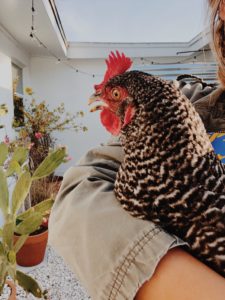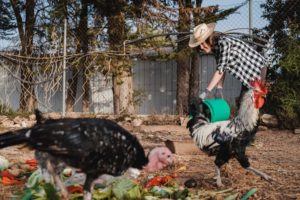A new outbreak of Salmonella has swept the nation, and the source points to backyard poultry. As of September 7, there have been 863 cases in the United States, spanning 47 states. Hundreds of people have been hospitalized, and two people have died.

This strain of Salmonella has been traced to backyard poultry enclosures, bedding, and waste. In further research, the CDC tested samples from 382 infected individuals, one animal, and nine environmental samples to predict the level of antibiotic resistance of the bacteria. At least 41% of the samples were predicted to resist one or more antibiotics.
Who is at greater risk of Salmonella?
Everyone who comes in contact with chicken flocks may be at risk, but some demographics are more vulnerable than others. Pregnant women, infants, children, seniors, and people with weakened immune systems are highly susceptible to a more severe presentation of the illness. This is also a contagious disease and one that can be asymptomatic, meaning that the birds or even other people may be carriers and not know it.

What are the symptoms of Salmonella?
The symptoms generally include diarrhea, abdominal cramps, fever, nausea, and vomiting. It typically sets in anywhere from 6 hours to 6 days after contact with the bacteria, and many people recover on their own. It takes between 4-7 days for a healthy adult to recover, but for high-risk groups, the infection can warrant hospitalization.
If you or a loved one are displaying any of the following symptoms, seek medical attention immediately:
- Diarrhea and a fever greater than 104 °F
- Diarrhea for more than 3 days without improvement
- Bloody diarrhea
- So much vomiting that you are unable to retain liquids
- Dehydration and its signs, including:
o Less frequent urination
o Dry mouth and/or dry throat
o Dizziness when standing
How to stay safe:
In order to eradicate the Salmonella outbreak, owners, stores, and hatcheries must all take precautions. However, the CDC’s guidelines look slightly different for each party. If you are an owner:
- Wash hands after exposure for 20 or more seconds
- Keep flocks and their materials outside; if you do not, you risk spreading infection into your home
- Do not let children under five touch birds or venture into their space, especially not unsupervised
- Do not kiss or snuggle birds; the infection is much more easily transmitted if you put your mouth on or near the carrier
If you work in a store that sells poultry:
- Source poultry from hatcheries that take steps to reduce contamination and participate in the optional USDA National Poultry Improvement Plan (USDA-NPIP)
- Clean and sanitize poultry displays between shipments
- Ensure that you’re keeping your customers safe and healthy by:
o Providing handwashing stations near poultry displays
o Placing poultry displays out of reach of customers, especially children
o Providing health information to potential and established customers
If you work in a hatchery:
- Use the best management practices possible to help prevent the spread of Salmonella in poultry
- Volunteer to participate in the optional USDA-NPIP U.S. Salmonella Monitored Program and monitor your flocks for Salmonella germs
- Provide health information to potential and established customers regarding the risks of Salmonella and how to avoid it
What about the eggs?
You may be asking about the eggs. Are they still safe to eat? Well, sort of. It depends on the egg handling practices you adopt. To ensure that eggs are still safe for consumption, you should:
- Collect eggs often and throw away all cracked eggs
- Rub off dirt with fine sandpaper, a brush, or a cloth
- Don’t wash in cold water, as that can pull germs into the egg
- Refrigerate eggs to keep them fresh
- Cook eggs until the yolk and white are firm; cook egg dishes to an internal temperature of 160 °F
If you have experienced a foodborne illness through no fault of your own, you may be entitled to compensation. For a free consultation with a foodborne illness attorney, call Allen & Allen today, at 866-388-1307.





